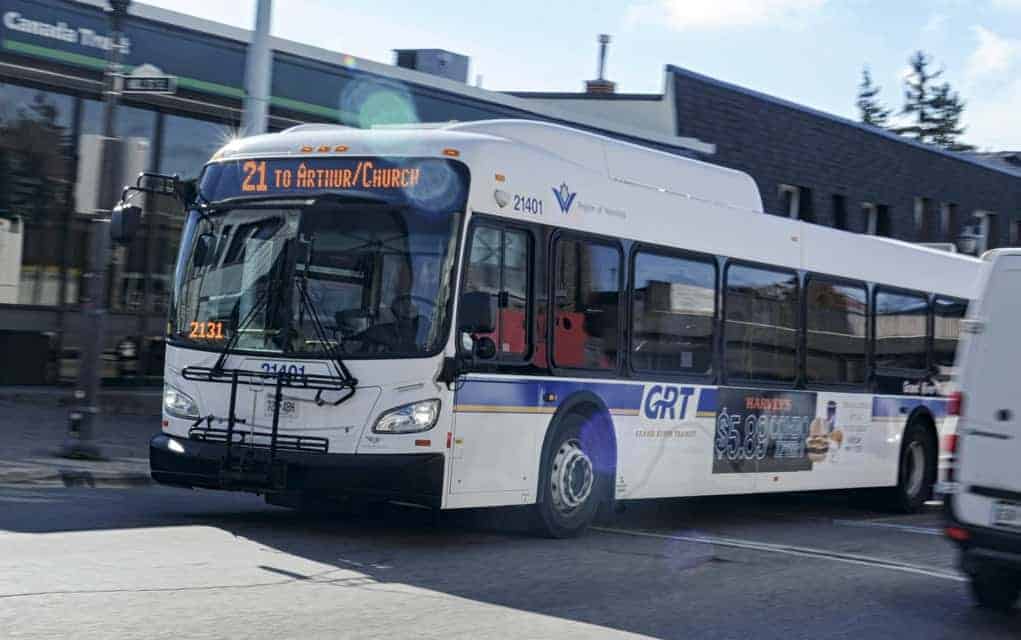Even as transit ridership and revenues lag behind pre-pandemic levels, Grand River Transit is mulling over a proposal that would see fare-free rides from some members of the public.
The Waterloo Region Age Friendly Network last month pitched regional councillors on a plan that includes offering free rides to seniors on Sundays and Wednesdays and for children under the age of 12 every day.
According to the organization’s Rick Chambers, the idea has been part of an ongoing conversation for a number of years.
There are plenty of good reasons for such changes, he says, pointing to the prospect of increased ridership, helping the region meet its climate and seniors’ strategy goals, and creating lifelong transit users.
“The region has environmental goals that it has set for itself. And if we continue to use vehicles or cars with one driver in them and congested roads….we’re not going to reach that goal. So that’s one reason to reduce congestion on the roads and reduce single-occupancy cars and reduce our air pollution,” Chambers said.
“GRT is always complaining about not getting back to its ridership levels pre-pandemic. Well, one way to do that would be to offer free rides for kids. The children would ride free but the parents would be paying and that would achieve a number of things. One, it would show the children how to use the system. It would make them transit friendly and we’re trying to develop a transit culture here where people use it on a regular basis,” he added.
According to Neil Malcolm, acting director of transit services at GRT, in most areas across the region ridership is around 80 to 90 per cent of where it was prior to the COVID-19 shutdowns.
“Some of our busiest routes are on universities [where] we’re back at or even above in some cases where we were pre-pandemic,” he said.
Malcolm said that there is merit to the idea of creating lifelong transit users.
“If you get young people, youth and teenagers, that know how to ride, if they’re used to using transit for some of their travel, I think that could encourage people to be lifelong riders because they learn how to use the system. They know that they can rely on it, and it will teach them at a younger age that using transit is good for the environment. And it’s a good way to get around the region,” he said
Having greater access to transit will become more important as the region’s population continues to age, Chambers said.
While Grand River Transit had discounted fares based on age in the past, it moved away from that in April of 2020 in favour of discounts based on income.
“GRT…put all their eggs in the one basket, which was the one reduced fare for people under a certain income level. That, I guess, does work for that particular audience. But if we want to build ridership, this is not so much about affordability as it is access and ability for people to use it and also showing them how to use it,” Chambers said, noting that the Age Friendly Network provides ride-a-bus sessions to show seniors how the system works.
However according to Malcolm the barriers to accessing to transit are not based on cost.
“We always want to encourage more ridership. It’s good for the cities; it’s good for the region. It’s good for the environment, to get more people using the system… [however] we constantly hear from people that they want access to more frequent, more reliable – it’s the level of service. So getting more ridership really is contingent on providing the right level of service to make it convenient for people to choose to use transit,” he said.
While the Age Friendly Network’s report to council pointed to a number of municipalities that offer free transit for seniors on certain days, including Brampton, which is free every day, and to others which let kids under 12 ride for free at all times, Malcolm said GRT’s priority is on those who cannot afford the fare.
“So the focus is really on supporting residents that can’t afford to pay and making sure that they receive access to affordable transit instead of just providing concession fares based on age. When you look at seniors in the Region of Waterloo, less than three per cent of seniors in the region would be considered low-income, so that’s not a group that we would focus on in terms of them needing reduced fare,” he said.
According to a report by GRT presented to council at a January 18 Strategic planning and budget committee meeting, offering free rides to seniors one day a week would result in a net loss for GRT of $111,000 per year.
GRT staff will re-examine giving free rides to children under 12 and present another report to the budget committee on February 8.









